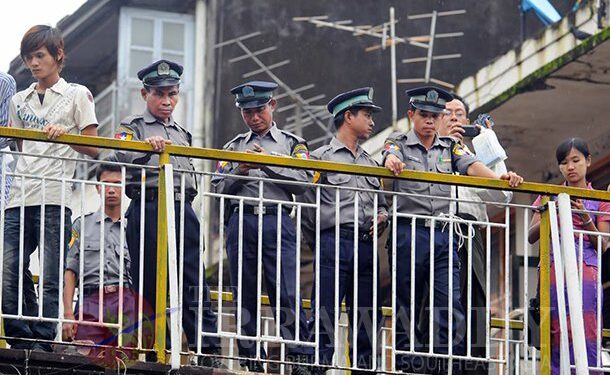RANGOON — Activists have expressed concern over a decision by Burma’s Home Affairs Ministry to bring under its direct control the country’s Special Branch police, an institution notorious for suppressing dissent by jailing critical voices under the former military regime.
A number of politicians and activists were put behind bars over the years by Special Branch (SB), which effectively used trumped-up charges as a tool to restrict activities deemed anti-government.
On Monday, an order signed by Home Affairs Minister Lt-Gen Ko Ko announced that his ministry had brought the Special Branch of the Myanmar Police Force under its direct control as of Feb. 1, a move many politicians view as granting the unit more authority to an institution with a checkered past.
Previously, Special Branch was a department within the Myanmar Police Force.
Tun Kyi, from the Former Political Prisoners Association, said the move was a cause for concern among Burma’s pro-democracy advocates, and could pose a threat in particular to student activists who have been out on the streets across Burma to protest a controversial National Education Law.
“SB has in the past violated human rights on the pretext of [national] security,” said Tun Kyi.
“What they are doing is not for democratic reform, but to perpetuate their power. It is SB that has constantly arrested politicians. I see the move as a negative change,” Tun Kyi told The Irrawaddy.
Jimmy, a prominent member of the 88 Generation Peace and Open Society, said the administrative reshuffle would serve to empower Special Branch, and signaled the government’s intention to better monitor political activities.
“The Home Affairs Ministry will give direct instructions to SB as regards politicians,” Jimmy said.
President Office’s Director Zaw Htay defended the move, however, saying it was simply intended to streamline the administrative apparatus by combining government departments.
“It is not that SB alone is being moved,” Zaw Htay told The Irrawaddy.
“We’ll also merge around 20 other government departments. For example, we’ll merge the Road Transport Department and Road Transport Administration Department under the Rail Transport Ministry. We’ll merge all the departments have the same practical function to streamline the bureaucracy,” he said.
Special Branch took the lead in collecting information and arresting dissenters after Burma’s powerful Military Intelligence apparatus, which was headed by Lt-Gen Khin Nyunt, was dissolved in 2004.
Last year, Special Branch officers were dispatched to several offices of local media outlets, including The Irrawaddy, and questioned staff about editorial content and finances. Special Branch said the purpose of the inquiries was to find out how the publications had managed to stay afloat in a difficult market for print media.
“It [Special Branch] is used to detaining politicians as it wishes. Now, as the position has been changed, it will be more arrogant than ever by using the [home affairs] minister’s order as an excuse. I am sure it is bound to act with reckless disregard,” said Tun Kyi.

















